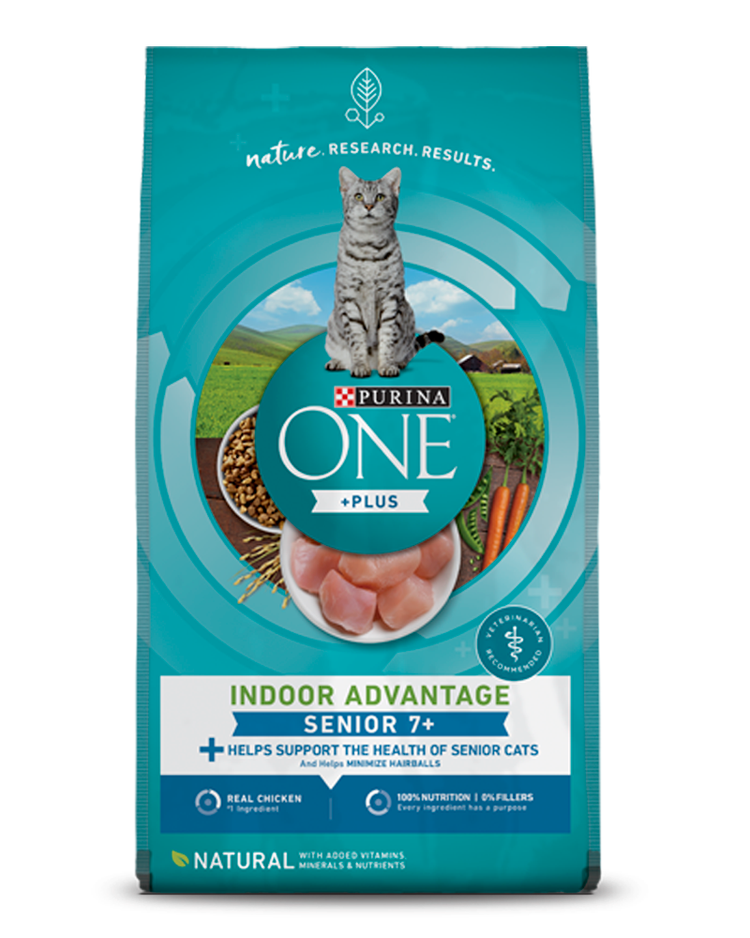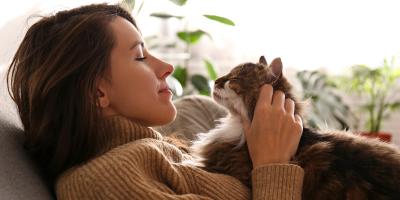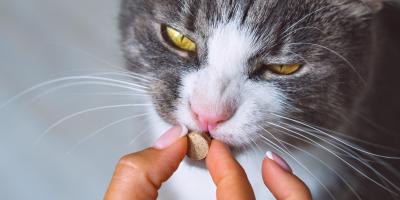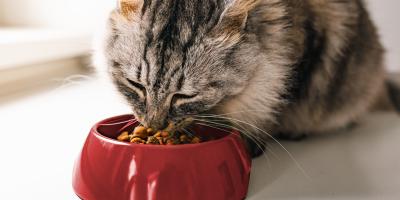Common Older Cat Behavior Problems

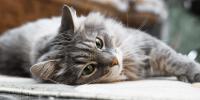
As we age, we all encounter changes we must deal with, some good and some bad. Cats age just like us, but they have their own unique set of concerns.
Are you wondering about common older cat behavior problems? If you have an older cat, learn here from our Purina experts why super senior cat behavior problems arise and the changes that happen with a cat as they reach senior age, diving into specific geriatric cat behavior, including:
- Cognitive decline
- Confusion/disorientation
- Not using the litter box
- House soiling
- Anxiety
- Lethargy
- Aggression
- Changes in eating
- Changes in sleeping
- Not responding to their name/noises
Our experts unpack the common behavior changes in senior cats, how to prevent and care for a senior cat with behavioral issues, and what warrants a visit to your veterinarian.
Why Does a Cat’s Behavior Change With Age?
As cats grow older, they may start expressing more undesirable behaviors for various reasons, including but not limited to:
- They might be in pain, making it harder to act as they used to.
- Loss of memory, awareness, hearing or sight may cause them anxiety or depression.
- Overall physical decline may cause them to be less mobile.
- Cats with thyroid, liver or kidney conditions may urinate more.
- Coupled with other conditions, they may stress and then feel threatened, causing them to spray and go to the bathroom outside of the litter box, as spraying is usually a territorial behavior.
Common Senior Cat Behavior Problems
Read on to learn about specific typical cat behavior problems/conditions, including a high-level summary of symptoms and causes.
Cat Cognitive Decline
Feline cognitive dysfunction, or cognitive decline is common in elderly cats. It tends to appear and develop later in a cat’s life and is a sign of old age. Some also refer to this behavior problem as “cat dementia.”
The main symptom of cognitive decline is confusion and disorientation. Other signs may include a clingy older cat or if you see your elderly cat staring at a wall for hours on end. Constant meowing in older cats may be a sign as well. Cat parents, you should keep a close watch on the disease’s development and discuss any increasingly unusual behavior with your veterinarian, who can help you determine the next best steps to take.
Cat Confusion and Cat Disorientation
One of the first signs of age-related confusion and disorientation might include forgetting litter box training and defecating or urinating in the wrong place(s). Senior cats experiencing confusion and disorientation may also display personality changes, appear disoriented, and be more vocal than they were when they were younger. They may also show less interest in their surroundings and interact less with other animals and people than they once did.
Senior Cat Not Using the Litter Box
Not using the litter box or forgetting litter box training may signal a cat suffering from cat dementia that is experiencing confusion and disorientation, as mentioned above. In cognitive decline, a cat may forget where the litter box is and urinate or defecate elsewhere as a response. However, cognitive decline isn’t the only cause of not using the litter box. Whether an older neutered male cat spraying or any senior cat peeing outside the litter box, it may indicate a medical issue. Eyesight loss, constipation, pain from arthritis, kidney disease, feline urinary issues like feline idiopathic cystitis, urinary stones or urinary tract infections (UTIs) can cause a senior cat to not use their litter box. Some cats may also experience pain when getting into the litter box. If your cat stops using their litter box, take your cat to your veterinarian to see why they’re engaging in this behavior.
Senior Cat House Soiling
Another common symptom of cat dementia and rejecting litter box use is a senior cat pooping outside the litter box and inside their own home, aka house soiling. In fact, according to the ASPCA, it’s the most common reason for senior cats to end up seeing behaviorists. As with not using the litter box, a variety of other medical concerns may cause house soiling, such as brain tumors, endocrine system disorders, kidney dysfunction, mobility-affecting neuromuscular conditions and sensory decline. Any disorder that makes your cat need to use the litter box more or decreases their bowel or bladder control can cause this problem. If your cat engages in house soiling, the best first step is to bring your cat to your veterinarian for a complete examination, and they can determine the next best steps.
Senior Cat Anxiety
Senior cat anxiety may be a symptom of cat dementia. In this condition, a senior cat may forget the locations of food bowl(s), litter box(es) and furniture. Cognitive decline causes stress over environmental changes. As cats age, their capacity to cope with stress can also decline, resulting in anxious and moody behaviors.
Senior Cat Lethargy
Older cats may experience increased lethargy coupled with a change in appetite or weight, which is often a symptom of cat anxiety or depression. It’s also frequently a symptom of a physical medical problem. These subtle changes in behavior can be important clues about the cat's physical health. Even subtle changes in a cat warrant a vet visit since they are good at hiding illness. If you notice these changes in your senior cat, contact your veterinarian immediately.
Aggression in Older Cats
Next to senior cat litter box problems, senior cat aggression toward other animals or people is one of the most common behavior issues in senior cats. Senior cats may act aggressively in old age because their patience has declined over the years, and they’re less and less tolerant of any changes to their routines. It may also stem from the senior cat feeling unwell, so they act out of some form of pain. Aggression can also happen due to sensory changes (e.g., loss of hearing, vision, etc.) and mobility changes that do not allow them to use their territory in the same way. It’s essential to contact your veterinarian if you notice your cat becoming suddenly aggressive to rule out any possible painful causes.
Senior Cat Changes in Eating
Suppose your senior cat changes their eating habits. In that case, it’s usually due to medical issues. A visit to your veterinarian can answer which issues your cat is presenting. Another possible cause is depression. Depression might happen in senior cats after a change in their territory, such as the addition of a new pet. In reaction to the change, they may withdraw from eating. In other cases of senior cat depression, they may start eating more or cease eating entirely and then start to lose weight.
Important Note: If your cat stops eating, it’s a cause for extreme concern as it can lead to hepatic lipidosis. They must see a vet as soon as possible if they stop eating.
Our Pro Plan Prime Plus food is higher in calories than adult cat food to help maintain lean muscle mass, but every senior animal, whether dog or cat, is unique and needs individual assessment from their veterinarian.
Senior Cat Changes in Sleeping
Senior feline behavioral changes may signal depression, especially when this symptom is alongside behavioral changes, such as loss of interest in play, loss of appetite and loss of engagement in routine activities they once loved. Sleep changes may also signal various medical conditions a veterinarian should diagnose and treat. Contact your veterinarian if your senior cat sleeps more or less than they used to.
Senior Cat Not Responding to Their Name/Noises
Hearing loss is the top cause for a senior cat to no longer responding to their name or reacting to loud or unusual noises. They might not be able to hear their name or those noises like they used to. Other symptoms of hearing loss in senior cats may include some disorientation or elderly cat yowling. Other medical conditions, such as ear infections, can cause senior cats to not respond to their name or to not respond to unusual or loud noises. It can also cause elderly cat yowling at night. Contact your veterinarian if you notice your cat engaging in that type of elderly cat behavior.
Did you know: Deaf cats can allow their deafness to go unnoticed for a long time by using their other senses to compensate for their lack of hearing.
How to Prevent Senior Cat Behavior Problems
Has your cat yet to experience any of the above-listed older cat behavior problems? If not, then with reasonable care, these problems can be prevented or delayed. A few of the ways you can do that include:
- Ensuring water is fresh, clean, easily accessible and plentiful prevents dehydration and improves kidney function in senior cats. Because senior cats may forget to drink, switching to wet cat food may be an excellent way to ensure your cat stays hydrated if you suspect this is the case. Also, contact your veterinarian if you notice your cat drinking less.
- As with younger cats, slowly introducing new pets is always a good idea to reduce stress and territorial aggression. Another good way to reduce senior cat aggression is introducing more playtime into their routine.
- Mental enrichment is significant in upholding your cat’s brain health. Expertly designed senior cat toys can provide the stimulation they need while accounting for health problems senior cats face, like osteoarthritis.
- Keeping up with your routine veterinarian checkups is paramount to ensure your cat is in the best health they can be in. Senior cats may benefit from an increase in visits.
How to Care for a Senior Cat With Behavior Problems
While you can’t prevent your cats from getting older, you can care for older cat behavior problems in several ways. Here are some of those ways.
Primarily, when your cat turns senior (as early as age seven), watch for any signs of aging cat behavior changes, no matter how subtle. This is best accomplished by monitoring and understanding your cat's baseline behavior before there are any problems. Contact your veterinarian upon signs of aging cat behavior.
Other ways include:
- Consistent exercise routine
- Cat enrichment games for mental acuity
- Brushing them regularly to help them groom
- Keeping food, water and litter box access as easy as possible for your senior cat
When to Seek Professional Help
Suppose your cat shows any of the symptoms mentioned above. In that case, the best next step is to take them to a veterinarian to determine the cause of the older cat behavior. If it isn't a medical problem, your veterinarian may refer your cat to a behavioral specialist or a veterinary behaviorist, who will work with you to determine the best treatment path forward.
For more expert tips on caring for your senior cat, explore our other senior cat behavior articles.

Be Rewarded for Your Purina Purchases
Earn and redeem points for Purina products with myPurina app.

